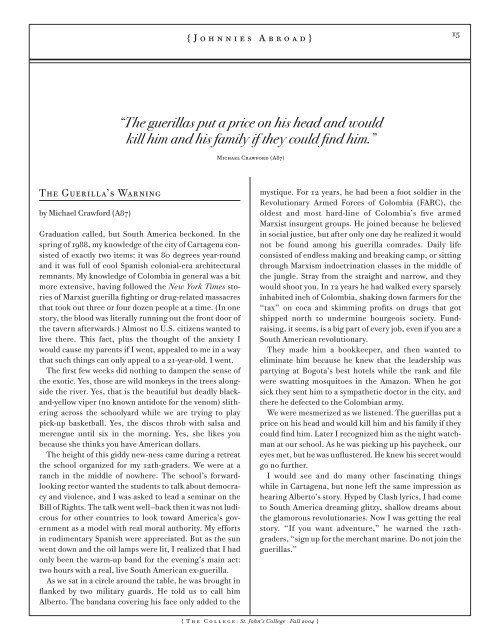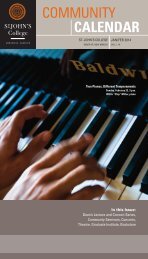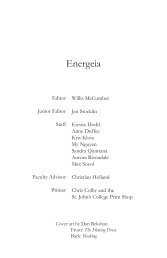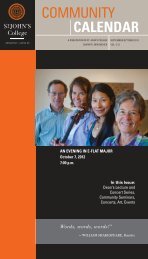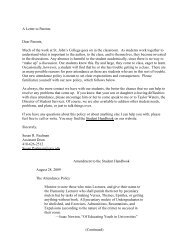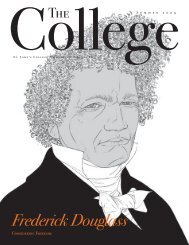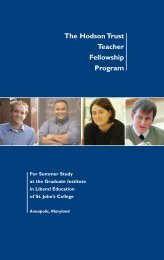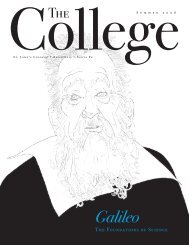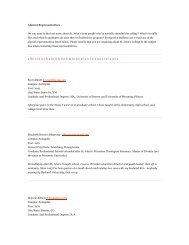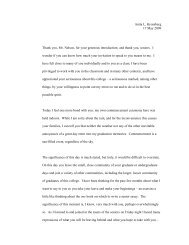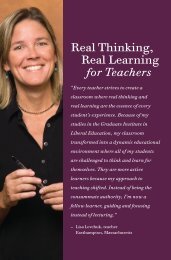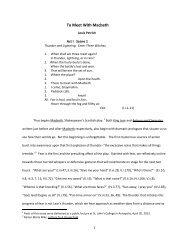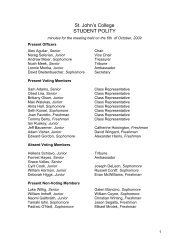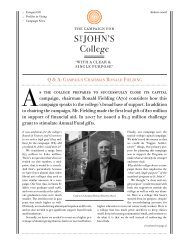Magazine - summer 03 - St. John's College
Magazine - summer 03 - St. John's College
Magazine - summer 03 - St. John's College
You also want an ePaper? Increase the reach of your titles
YUMPU automatically turns print PDFs into web optimized ePapers that Google loves.
{Johnnies Abroad}<br />
15<br />
“The guerillas put a price on his head and would<br />
kill him and his family if they could find him.”<br />
Michael Crawford (A87)<br />
The Guerilla’s Warning<br />
by Michael Crawford (A87)<br />
Graduation called, but South America beckoned. In the<br />
spring of 1988, my knowledge of the city of Cartagena consisted<br />
of exactly two items: it was 80 degrees year-round<br />
and it was full of cool Spanish colonial-era architectural<br />
remnants. My knowledge of Colombia in general was a bit<br />
more extensive, having followed the New York Times stories<br />
of Marxist guerilla fighting or drug-related massacres<br />
that took out three or four dozen people at a time. (In one<br />
story, the blood was literally running out the front door of<br />
the tavern afterwards.) Almost no U.S. citizens wanted to<br />
live there. This fact, plus the thought of the anxiety I<br />
would cause my parents if I went, appealed to me in a way<br />
that such things can only appeal to a 21-year-old. I went.<br />
The first few weeks did nothing to dampen the sense of<br />
the exotic. Yes, those are wild monkeys in the trees alongside<br />
the river. Yes, that is the beautiful but deadly blackand-yellow<br />
viper (no known antidote for the venom) slithering<br />
across the schoolyard while we are trying to play<br />
pick-up basketball. Yes, the discos throb with salsa and<br />
merengue until six in the morning. Yes, she likes you<br />
because she thinks you have American dollars.<br />
The height of this giddy new-ness came during a retreat<br />
the school organized for my 12th-graders. We were at a<br />
ranch in the middle of nowhere. The school’s forwardlooking<br />
rector wanted the students to talk about democracy<br />
and violence, and I was asked to lead a seminar on the<br />
Bill of Rights. The talk went well—back then it was not ludicrous<br />
for other countries to look toward America’s government<br />
as a model with real moral authority. My efforts<br />
in rudimentary Spanish were appreciated. But as the sun<br />
went down and the oil lamps were lit, I realized that I had<br />
only been the warm-up band for the evening’s main act:<br />
two hours with a real, live South American ex-guerilla.<br />
As we sat in a circle around the table, he was brought in<br />
flanked by two military guards. He told us to call him<br />
Alberto. The bandana covering his face only added to the<br />
mystique. For 12 years, he had been a foot soldier in the<br />
Revolutionary Armed Forces of Colombia (FARC), the<br />
oldest and most hard-line of Colombia’s five armed<br />
Marxist insurgent groups. He joined because he believed<br />
in social justice, but after only one day he realized it would<br />
not be found among his guerilla comrades. Daily life<br />
consisted of endless making and breaking camp, or sitting<br />
through Marxism indoctrination classes in the middle of<br />
the jungle. <strong>St</strong>ray from the straight and narrow, and they<br />
would shoot you. In 12 years he had walked every sparsely<br />
inhabited inch of Colombia, shaking down farmers for the<br />
“tax” on coca and skimming profits on drugs that got<br />
shipped north to undermine bourgeois society. Fundraising,<br />
it seems, is a big part of every job, even if you are a<br />
South American revolutionary.<br />
They made him a bookkeeper, and then wanted to<br />
eliminate him because he knew that the leadership was<br />
partying at Bogota’s best hotels while the rank and file<br />
were swatting mosquitoes in the Amazon. When he got<br />
sick they sent him to a sympathetic doctor in the city, and<br />
there he defected to the Colombian army.<br />
We were mesmerized as we listened. The guerillas put a<br />
price on his head and would kill him and his family if they<br />
could find him. Later I recognized him as the night watchman<br />
at our school. As he was picking up his paycheck, our<br />
eyes met, but he was unflustered. He knew his secret would<br />
go no further.<br />
I would see and do many other fascinating things<br />
while in Cartagena, but none left the same impression as<br />
hearing Alberto’s story. Hyped by Clash lyrics, I had come<br />
to South America dreaming glitzy, shallow dreams about<br />
the glamorous revolutionaries. Now I was getting the real<br />
story. “If you want adventure,” he warned the 12thgraders,<br />
“sign up for the merchant marine. Do not join the<br />
guerillas.”<br />
{ The <strong>College</strong> • <strong>St</strong>. John’s <strong>College</strong> • Fall 2004 }


